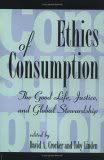This weekend, I started trying to eliminate my backlog of unread books. Last night I began reading Ethics of Consumption a compilation of scholarly article on, well, the ethics of consumption by ethicists, philosophers, economists, and social scientists.
Two possible projects:
======
(1) I'm not sure if any research has been done in the Philippines regarding ethical views towards buying among consumers. If there is no such research, I would like to undertake it, although of course I'd need to learn how to undertake an empirical study. (I did a course on Experimental Psychology in college, so I do have a teeny bit of background, but of course it isn't enough.)
======
(2) Another interesting point in the book is the reflection on what can be considered "sufficient" for a person. In my undergraduate Theology of Liberation class, we were introduced to the notion that a person is "poor" when he is a "non-person," implying not only an economic state but also a sociological state where a person lives without dignity.
On both the economic and sociological counts, this is a muddled definition. What we in the contemporary age would consider to be "necessary for survival" is different form what people would consider to be such 500 years ago.
Even more complex is the question of what is it to live "with dignity." Other scholarly articles also allude to sociological measures such as "happiness" or self-perceptions of poverty. One of the articles I was reading in the book suggested, however, that, as one might expect, one's perception of how poor one is has more to do with one's relative standing in society, or how one is treated in society, than one's absolute income or economic state.
If that is the case, then it would seem that at least one aspect of "poverty" is not so much a question of income but a question of how people ought to be treating one another.
Sunday, January 21, 2007
Subscribe to:
Post Comments (Atom)


No comments:
Post a Comment